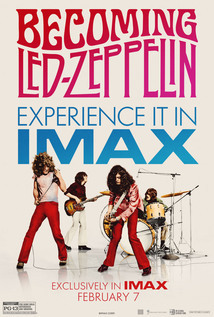

Led Zeppelin joins the ranks of The Rolling Stones, U2, The Jonas Brothers, Michael Jackson, Billie Eilish, The Beatles, David Bowie, and Taylor Swift in getting an IMAX documentary/concert film. But Becoming Led Zeppelin is by far the most dichotomous of all the large-format lovefests I've seen made about a great rock group or pop artist. The three surviving members of the storied, hard-rockin', hard-touring, hard-partying English band that pioneered stadium rock, paved the way for heavy metal, and helped shift the focus of FM radio in the late 1960s from hit singles to the long-playing album, wax fondly about their formative years, coming together as a band, recording their first two records, and touring the US. If you know anything about this band (and I'm only a casual fan), it is tough to reconcile their music and their legendary legacy of rock 'n' roll excess with the kindly old grandfathers we see on screen, who come off like wizened British academics analyzing something they couldn't possibly have participated in.
Bernard MacMahon, the director of the American Epic movies, films each living band member—guitarist and producer Jimmy Page, lead singer Robert Plant, and bassist John Paul Jones—individually in a similar set and has them tell stories and react to footage of their early years, as well as a never-before-heard interview with drummer John Bonham. The group disbanded in 1980 after Bonham died by choking on his own vomit after consuming a massive amount of vodka. But you won't learn that factoid from this movie, nor will you get any sense of how debauched these guys were when they were a band—their role as pioneers and purveyors of the drug-fueled, groupie-bangin', amoral rock 'n' roll lifestyle was arguably as interesting as their music.
Becoming Led Zeppelin is the latest in the trend of authorized non-fiction films about famous people in which the subjects have some or total control over the focus, shape, and content of the resulting historical account. This type of documentary can be both revelatory—it's always fascinating to see how older celebrities present themselves to the world (especially when you know a lot about them)—and unscrupulous, in that these distorted "fact-based" works can sometimes become the definitive record of a subject. I don't think there's too much danger of this movie becoming the record future generations will use to learn everything there is to know about Led Zeppelin, but the lack of any discussion about the band's seedier side makes this a very odd rock doc indeed. (Perhaps there will be a follow-up film that covers the second half of the band's existence called Unbecoming Led Zeppelin?)
Still, this deviation from the typical VH1 Behind the Music formula and the fact that the movie only covers the first half (or third) of the band's story allows this documentary to focus and expand on aspects of history and musicianship often left on the cutting room floor of typical movies of this ilk. We also get to hear a lot of good, long stretches of songs. Director Bernard MacMahon and editor Dan Gitlin find a wealth of footage where we actually get to see real performances, which is not easy to find in this era. The sequences made from old footage synced to pre-recorded music work pretty well. An early archival TV clip of Shirley Bassey singing "Goldfinger" underscores Page and Jones discussing their time working as session musicians playing on iconic tracks for Donovan, the Rolling Stones, the Yardbirds, Lulu, Petula Clark, and the Goldfinger soundtrack. In this clip, we can see that Bassey is really singing live over the pre-recorded instrumental track rather than lip-syncing to her studio vocal, and the excellent clip plays for longer than I would have expected. This sets the template for what will follow when we see full and near-complete performances of many songs from the first two Led Zeppelin albums, as they tell us about their time touring America and then returning to England.
This is not to say that the picture is above generic montages that place the band in the context of the times, using all the standard late-60s footage that every other documentary and fictional film about this era trots out. There are certainly some questionable choices here that make me wonder—if there was time for this, why not that? But there's no question: this movie looks and sounds great. Whatever "optimization for IMAX" was done, seeing this movie on the 94'x 46' IMAX screen at the Chinese Theater in LA with a packed house was a thrill. And since this band is known for its rhythm section, there's never been anything in any rock doc I've seen before like having John Paul Jones explain what it was like to "fall in love with John Bonham's right foot" and then get treated to hearing classic Zeppelin tunes, with their signature foot peddle and bass chords, reverberating through the 44 speakers in that auditorium. I've never owned a Led Zeppelin album, but you can be sure I went out and bought one the day after I saw this movie.
The latest authorized non-fiction film about famous people, in which the subjects have some or total control over the focus, shape, and content of the resulting historical account, yields a slightly revisionist retrospective. However, both the clips and interviews are exciting and informative.




